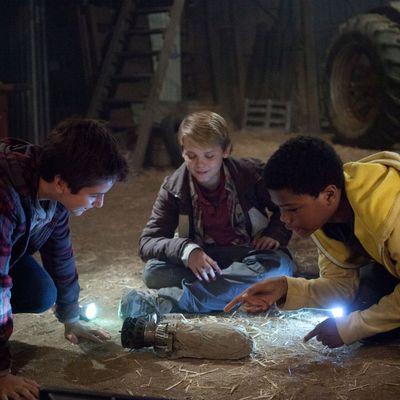
It sounds too craven to miss: Mix the warm and fuzzy kids-meeting-aliens antics of E.T. the Extra-Terrestrial or Super-8 (or Mac and Me, if you must) with the bro-tastic found-footage style of Project X or Chronicle. You get innocence and wide-eyed wonder on one side, savvy ÔÇ£realismÔÇØ on the other. Thus ordered, so delivered: Dave GreenÔÇÖs Earth to Echo has just enough teen angst to toughen up its adorability and to temper its predictability. ItÔÇÖs a simplistic movie, but thereÔÇÖs a darkness to it.
The film opens on a montage of kids lamenting to the camera that their small suburban neighborhood of Mulberry Woods, Nevada, is about to be mowed over to make room for a freeway. All the families are moving to different places, which means that our three 13-year-old heroes are about to go their separate ways. ÔÇ£Thanks for paving over the only place where IÔÇÖve ever had any friends,ÔÇØ brooding foster kid Alex Nichols (Teo Halm) tells us. ÔÇ£TheyÔÇÖre the only ones who get me,ÔÇØ says oddball tech-wizard Reginald ÔÇ£MunchÔÇØ Barnett (Reese Hartwig). ÔÇ£IÔÇÖm an acquired taste.ÔÇØ ItÔÇÖs all being captured on camera by Tuck Sims (Brian ÔÇ£AstroÔÇØ Bradley), who articulates the filmÔÇÖs themes of friendship and vulnerable, adolescent powerlessness. ÔÇ£YouÔÇÖre going along, feeling like your own person with your own friends. And then something like this comes along that you have no power to stop. ÔÇÿCause youÔÇÖre just a kid.ÔÇØ
Before you can say ÔÇ£E.T. phone home,ÔÇØ adolescent empowerment arrives in the form of weird haywire patterns appearing on the kidsÔÇÖ phones (which they call ÔÇ£barfingÔÇØ). Upon discovering that the images might be maps, the kids pack their bags, grab their bikes, cue the Robin Hood: Prince of Thieves soundtrack, and head out to investigate. (ÔÇ£WeÔÇÖre gonna ride our bikes out into the desert without adult supervision,ÔÇØ Tuck yells at his distracted family, who just nod obliviously. He adds, just to check if theyÔÇÖre listening: ÔÇ£Also, rob a bank. And go to Mexico.ÔÇØ Nothing.) They soon come upon a weird metallic object, and inside that weird metallic object, an alien that looks like a cross between a robot owl and a baseball. Via additional phone signals, the alien, whom the kids christen Echo, sends them to more locations, where different pieces start to attach themselves to the object they found in the desert. Each piece seems to make Echo stronger. Along the way, the three boys also hook up with a pretty classmate, Emma (Ella Wahlestedt), who had previously seemed out of their league but who turns out to be a geek at heart as well. And, needless to say, as in E.T., there are some shady-looking adults who are very interested in this creature, and theyÔÇÖre not so keen on making friends.
Even though they see in the alien a fellow castaway, the kidsÔÇÖ relationship with Echo is curiously inert. Earth to Echo is much more about the bond between these children who are about to lose each other than it is about their bond with the alien. In E.T., the young protagonist ElliotÔÇÖs relationships and attitude were changed by his interaction with the extra-terrestrial: He became more compassionate, more in tune with the people around him, more confident. The kids in Earth to Echo just find affirmation that being alone sucks: ÔÇ£He was out in the middle of nowhere, on his own, like us,ÔÇØ they say. ItÔÇÖs a poignant reflection, but Henry GaydenÔÇÖs script doesnÔÇÖt work it so much as wallow in it.
But by putting these kids in a uniquely vulnerable situation ÔÇö theyÔÇÖre about to lose their homes and their friends, and adults donÔÇÖt seem to give a crap ÔÇö the film does gain a kind of urgency. And the found-footage style, which creates the illusion of these adolescents controlling their own narrative, enhances that immediacy. But are they in control? IÔÇÖm not sure. The alien brings these boys very little joy, or even accomplishment. Even so, Earth to Echo captures the darkness and uncertainty of that transition between childhood and the teenage years, when youÔÇÖve transcended one world and are on the cusp of another. WeÔÇÖve all been there: ItÔÇÖs a breathtaking and terrible place to be, exploding with possibility and wonder, emotional treachery and helplessness. The film canÔÇÖt quite reflect that complexity, but it evokes it. Earth to Echo resonates, despite itself.


